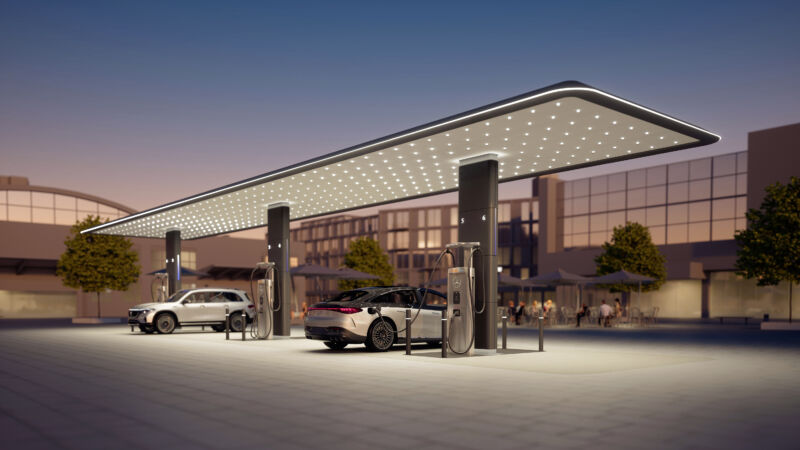On Thursday, Mercedes-Benz announced that it is entering the DC fast-charging arena for electric vehicles. The German automaker is in the midst of an electrification push and a plan to be carbon-neutral by 2039, and it evidently doesn't believe that the
current charging infrastructure is as good as
its new EVs, so it's doing something about the situation. Mercedes says it plans to deploy more than 10,000 fast chargers around the world, starting in North America.
The new network is separate from and independent of Ionity, the European fast-charging network backed by Mercedes, BMW, Ford, and Volkswagen. Here in the US, Mercedes is partnering with the charging company ChargePoint and MN8 Energy, a solar and battery-storage company. Together, they will deploy more than 2,500 DC fast chargers at more than 400 sites around the US by 2027.
"Mercedes-Benz customers deserve a compelling charging experience that makes electric vehicle ownership and long-distance travel effortless, and that’s why we are launching a global high-end charging network that will offer a charging experience to match the extraordinary Mercedes driving experience," said Ola Källenius, chairman of the board of management of Mercedes-Benz Group AG. "We are excited to start right here in North America with two strong and experienced partners, ChargePoint and MN8 Energy."
The chargers will feature plug-and-charge compatibility and won't be restricted to Mercedes' EVs. Mercedes also says the locations and surroundings will be carefully chosen—all too often, banks of DC chargers are located in desolate and lonely corners of mall parking lots that can make charging at night a stressful experience for some drivers. So the OEM plans to build the chargers "with food outlets and restrooms situated nearby." It also says there will be surveillance cameras and other security in place to provide "a safe and secure charging environment."
At least four plugs per hub, maybe as many as 30
Expect a minimum of four DC chargers at each hub, similar to an Electrify America charging location. But some hubs will have as many as 12 chargers, and there are plans for as many as 30 in some locations. The hubs will use ChargePoint's modular Express Plus system, which is capable of up to 500 kW per charging port, although Mercedes says that chargers will be "up to 350 kW" in power. And load management will ensure that if multiple EVs are charging at the same time, one charger doesn't end up throttling the rest.
"With this partnership, we are expanding upon our existing relationships with Mercedes-Benz and MN8 to deliver a seamless charging experience for drivers and turnkey charging solutions at no upfront cost to site hosts," said ChargePoint CEO Pasquale Romano. "We believe the expansion of charging hubs like these will enable the emergence of a new 30-minute retail economy at the intersection of innovation and accessibility that combines charging and commerce, giving drivers a superior experience to charge quickly and easily."
In keeping with the company's 2039 sustainability goals, the electricity it uses will come from green energy suppliers or come with renewable energy certificates. Some hubs will use solar to power the lighting and security cameras.
"MN8 Energy is on a mission to provide enterprise customers, such as Mercedes-Benz, with renewable energy and related solutions on their journey to an electrified, decarbonized world," said MN8 Energy President and CEO Jon Yoder. "Supporting the development of this exceptional charging experience helps address one of the most significant barriers to EV adoption—range anxiety. With each party playing to their strengths, we are thrilled to embark on this collaboration to expand charging access with Mercedes-Benz and ChargePoint."
None of this will be particularly cheap. In fact, the initiative will cost more than $1.1 billion (1 billion euro) over the next six or seven years, with the costs split evenly between Mercedes and MN8 Energy. And this is just the start—plans for more charger deployment in Europe and China will be announced in the future.
JONATHAN M. GITLINJonathan is the automotive editor at Ars Technica, covering all things car-related. Jonathan lives and works in Washington, D.C.
EMAIL [email protected] //
TWITTER @drgitlin




